29 AUGUSTI
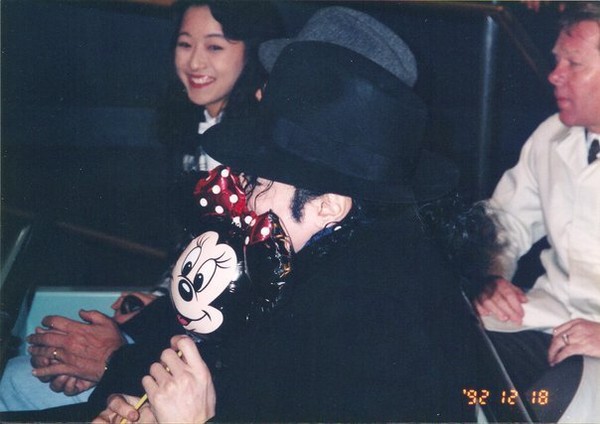
tack för att du är min klippa, en av mina största anledningar till att le, tack för din konst, för ditt enorma glödande hjärta, för din elegans, skönhet, för att du alltid var dig själv, oförfalskad, fördomsfri, genuin, kärleksfull, givmild, ödmjuk, så intelligent, passionerad, cool, sårbar, en kolossal nörd, sexig, sassy och så fantastiskt glad.
grattis på födelsedagen, raring.
VAD JAG ÄLSKAR MED MICHAEL #1
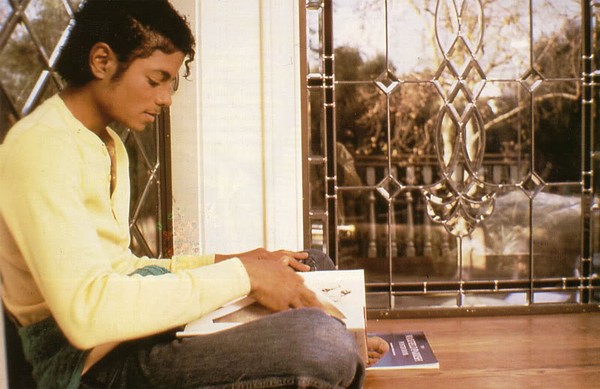
Hur han verkligen älskade att lära sig nya saker. Vetgirig som en svamp. Han slukade böcker om kultur, konst i alla dess former, människans historia, skönlitteratur, biografier om berömda människor som Walt Disney och Michaelangelo, djurens språk, hjärnans anatomi och skelettets delar. Människor i hans omgivning blev lite häpna när han kunde namnen på typ alla mer eller mindre kända konstverk. Han till och med läste tjocka böcker om statliga skatter och globalisering (Jermaine sa att han jämt hade lite udda val av böcker). Han hade skulder över en miljon dollar på bibliotek för att han inte lämnade tillbaka böcker i tid (han betalade tillbaka en viss del genom bibliotekets förfrågan om han kunde signera böckerna). Han till och med köpte ett bibliotek en gång och betalade kontant för det! Jag älskar att han grävde ner sig i allt möjligt och uppskattade de livet ut, så som Charlie Chaplins filmer. Hans livvakter berättade att de alltid såg honom med en bok i handen. Han var så intelligent och det är en grej jag beundrar gällande honom.
I'M HUMBLED IN YOUR GRACE
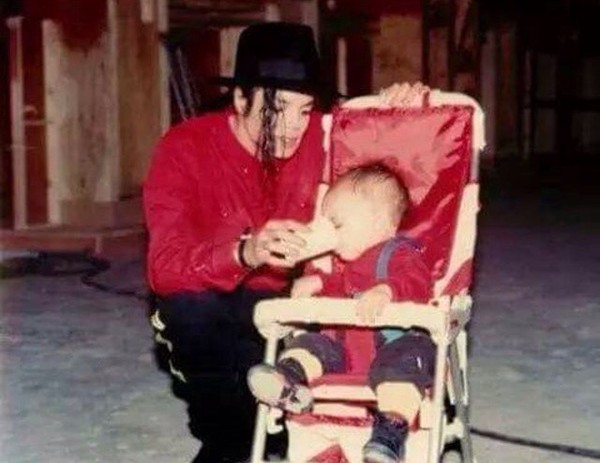
"Dör hellre än upplever den där smärtan igen" var en tanke som dök upp när jag såg Bad Tour på Wembley häromveckan. Började tänka på 25 juni, och att det närmades. Den här tanken fick mig i alla fall att gråta, för det var så sant. Natten mot 26 juni. Ingenting kan beskriva den smärtan. Ett stort värkande uppslitet hål i min bröstkorg, och hjärtat var som söndersmulat. Fan, vad ont det gjorde. Fysiskt. Tårarna var hämningslösa den natten. Satt på badrumsgolvet fram till 5 på morgonen... Grät varje dag i två månader efter det. 25 juni förändrade mig. Hans bortgång var ej okej.
Jag tänker på dig lika mycket idag som alla andra dagar. Jag tackar dig för vem du var, för att du alltid var dig själv oavsett vad, för du var undebart vacker, på alla sätt och vis. Tack för all konst du skapade, som jag dansar till, beundras och får lyckorus av och även ibland, som idag, gråter, för jag saknar dig så innerligt mycket. Jag älskar dig för evigt, Michael. Vila i frid, min ängel.
SUNFLOWER

*Mamma kommer hem från jobbet leendes*
Mamma: Jag har köpt dig en blomma!
Jag: En solros...? Michaels favoritblomma.
Mamma: Jag vet ju det.
Ibland är min mamma för söt. <3
LITE TANKAR OM BRORSORNA, BARA
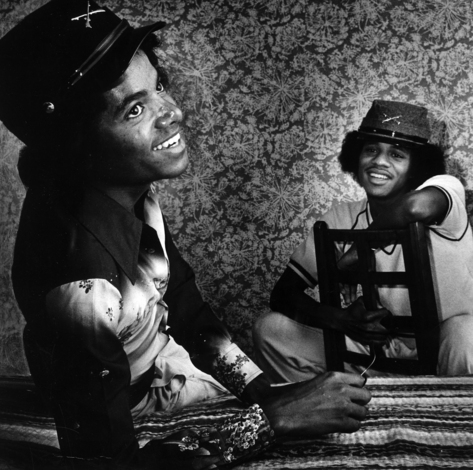
Jag blir frustrerad över brorsorna.
I dokumentären Michael Jackson: The life of an icon säger Tito: "It's sad, because I really feel that trial is what really depressed my brother out to the point where he just wasn't happy. He never went back to Neverland. For Michael not to go to Neverland, he must have been pretty sad, didn't want have nothing to do with that place ever again."
Men, i intervjun med Skavlan (där alla bröder, förutom Randy, var med) blir de väldigt upprörda över Skavlans fråga om att han var "in a bad place" i slutet av sitt liv. De skyller på media, att media ger helt fel bild av situationen. Kolla själva.
Nu håller jag på att läsa The magic, The madness, The whole story av J. Randy Taraborrelli och jag blev nöjd då denna ganska långvariga frustration reflekterades av författaren (som träffat Michael många gånger och som också är med i dokumentären). Taraborrelli skriver: "Without a doubt, the most annoying thing about the Jacksons' behavior over the years has been their frustrating inabaility to take responsobility for their own actions. Over the years, all of them have pointed fingers to external sources for their internal problems. Either it's managers, promoters, the public or, their favorite foe, "the media" that is held responsible for their problems – never themselves. Of course, the truth is that they almost always create their own internal dysfunction."
Jag rekommenderar verkligen den här boken. Jag förstår Michael mycket mer. Jag förstår varför han exempelvis distanserade sig själv från sina bröder i början av 80-talet. Vad vet bröderna om hans sista tid i livet ändå? Om ni har läst livvakternas Protecting Michael Jackson in his final days så vet ni att Michael i stort sett aldrig träffade någon annan än Katherine från familjen. Och några familjemedlemmar har skyllt på att det var Michaels anställda som höll familjen borta från honom (däribland Joe och Jermaine), men sanningen är den att Michael ofta inte ville träffa dem. Han blev ofta pressad av dem till att göra saker som han inte ville, däribland Victory Tour. Och jag vet att det är komplicerat, när de är familj och när de var ett band. Men de gav honom inte mycket val annat än att distansera sig själv från dem, när han ville gå solo (vilket han var tvungen att göra, han kunde inte alltid bära sina bröder). Det var mycket avundsjuka mot Michaels framgång mellan bröderna, även om de förnekar det. Jag förstår också, tack vare denna bok, mycket mer varför Michael var så ledsen under sin ungdom.
Ni borde helt enkelt läsa den här boken. Och livvakternas. Jag har läst Jermaines bok också, men familjens böcker (även Michaels Moonwalk) berättar inte den fulla sanningen, för de var och är tvungna att skydda sin image om "familjestyrka". De älskade varandra, men sanningen är att de inte var så nära som de vill få oss att tro.
JA DETTA HÄNDE

Syster: "Skulle du kunna bli attraherad av en kille med långt hår?"
Jag: "HAHAHAHHAAHAH"
Syster: "HAHAHHAHAHAHA"
Båda: "HAHAHHAHHAHASAHHAH"
Syster: "Jag glömde"
ALBUMTITLAR

Jag älskar hur alla Michaels albumtitlar beskriver så bra varje period i hans liv när de släpptes.
Off the wall var liksom hans första egna album, som han skulle vara soloartist på och samtidigt få ha full kontroll över. Han var redo att ta sig an världen och vara helt enkelt off the wall, skapa extraordinär musik och vara en pionjär. Han tog det steget här.
På grund av Thriller blev han en sensation världen över, alla visste helt plötsligt hans namn i varje hörn och tyckte att han var spännande. Här blev namnet Michael Jackson en thrill.
Efter att ha blivit utnämnd till att ha världen bäst sålda skiva och efter att ha vunnit så många priser och tillförlitlighet i branschen var han BAD. Och han drog ett understreck för att stärka detta när albumet släpptes 1987.
Det är långt ifrån bara jag som har sagt detta: 1980-talet tillhörde Michael Jackson. Han var Dangerous. Behöver jag säga mer?
Han var en artist som 5-åring och hade mycket musikhistoria bakom sig - han ville minnas och hedra detta samtidigt som han ville säga att han hade mycket mer att ge genom att också släppa mycket ny musik på dubbelalbumet HIStory.
Blood on the dancefloor må vara ett undantag för min poäng i det här inlägget. Excuse me. Haha.
Så mycket negativitet och falska anklagelser, och falska rykten skulle komma åt vem som helst. Det sårade honom, men det krossade honom inte. Han ville meddela världen, till både de som brydde sig om honom och till de som av ingen anledning som helst ogillade honom, att han var Invincible.
8 SEPTEMBER
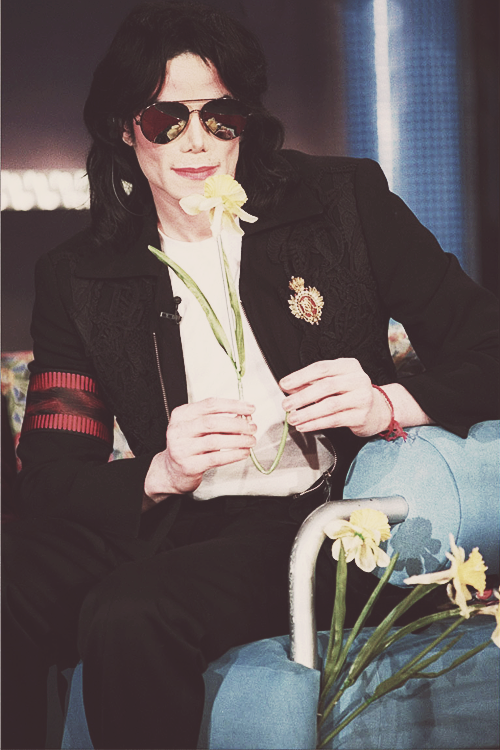
Att jag denna dag för fem år sedan skulle ha sett honom uppträda på en scen i verklighet övergår en människas möjliga kapacitet av hjärnceller att begripa. Det är fullkomligt oresonligt. Något så underbart skulle inte kunna existera, inte i mitt liv. Något som gör mig ledsen är att se ansikten i publiken som fick denna lycka, att se dem skrika av förtjusning och hänförelse, sjunga med i texterna, klappa vilt med händerna och dansa och hoppa till beatet, och frigöra överväldigade känslor genom att gråta för att han stod där på riktigt. Men samtidigt gläds jag åt det, naturligtvis, för deras kärlek till honom. Den där natten mot 26 juni, då jag befann mig på badrumsgolvet i flera timmar på grund av det mycket verkliga uppslitna och värkande hålet i min bröstkorg, ägnade jag inte en enda tanke till att min biljett nu var meningslös. Detta omvända faktum fanns inte i mina dåvarande tankar, vilket jag upptäckte långt senare, för det enda jag ville, var att ha honom här.
29 AUGUSTI 1958, 19:33

i början av hösten, när naturen förbereder sig som kreativast för sin förvandling av färger, föddes du. naturligtvis. du är bland det bästa i mitt liv. grattis på födelsedagen, raring.
MIN RAPPORT I ENGELSKAN
Minns ni detta? Jag valde att gå i motsatt riktning och skriva om hans välgörenhetsarbete istället för pedofilanklagelserna. Det känns mycket, mycket viktigare, eftersom det dels inte handlar om lögner och dels är det någonting som är värt mer uppmärksamhet än det får. Detta är rapporten i sin helhet, bortsett från källorna, och om ni inte har skrivit en rapport tidigare så är det många rubriker där man måste beskriva specifika delar, många gånger upprepa saker och ting. "Objective and hypothesis" var för mig svårast, för det är ju svårt att gissa sig till någonting man vet med säkerhet, haha. "Description and analysis" är själva resultatet, som ni kanske vet måste vara ren fakta (inga personliga vinklar), men sedan reflekterar jag resultatdelen i "Conclusions". (Ja, jag vet att jag snodde Berry Gordys citat i det absolut sista stycket, haha). Jag fick A på denna rapport.
MICHAEL JACKSON'S MUSICAL AND NON-MUSICAL ACHIEVEMENTS
1. Introduction
We all know who Michael Jackson is. We all think of him when we hear the words "King of Pop". It is widely known, for sure, that the name Michael Jackson is linked to this grand title, and vice versa. Everywhere you go, in every corner of the Earth, you will find people knowing who you are referring to, if you either decide to call him by his name or his title. But why and how did it happen? For what reasons did the entire world suddenly agree to call this musical artist "The King of Pop"?
There are many aspects to why his title is undisputed, since it is a matter of facts mixed with personal views. I have gathered – both major and minor – details from the professional life of Michael Jackson, that all contribute reasons, and finally an answer to why he is seen worldwide as the king of popular music.
I think it is important to learn about "the greats" – people who have dramatically changed and influenced an era to become immortalized in human history. Michael Jackson is one of these people, and should therefore be cherished. No other musical artist has reached as far as he did.
Other than being announced as The Most Successful Entertainer Of All Time by Guinness World Records, he was also a humanitarian, who cared deeply for the world. Not only did he donate a mind-boggling amount of money to charities in his lifetime; he put a lot of his time to interact with disadvantaged children all around the world, as well.
The questions I will base my work on are following:
1) Why is Michael Jackson called "The King of Pop"?
2) For what reasons was Michael Jackson a humanitarian?
2. Objective and hypothesis
I believe Michael Jackson must have been a loveable artist, and had an extraordinary impact on the entertainment business, to be accepted by everyone as "The King of Pop". I believe he was, in fact, the most influential artist ever, since he is seen as the best in the business by many of today's artists and dancers. I do not know any other musical artist that has been able to create that much hysteria and appreciation, for as long time as four decades. without falling from the very top of the industry.
As a humanitarian, I know he has released many songs about making the world a better place, and acted in different ways to accomplish it. I am sure that he must have been a loveable persona, as well as an artist, to earn the title "The King of Pop", since it is a matter of respect on various levels.
In order to find out the reasons for his undisputed title and to learn about his humanitarian work, I will read articles and books, watch videos and discover what people who knew him personally has to say.
3. Used theories and methods
To find valuable information in order to answer the questions I based my work on, I used the Internet and three books (one of them was Michael Jackson's autobiography, Moonwalk). Videos on YouTube were valuable, as well.
My theories on how the information was going to be, was true. He was, indeed, the most influential artist ever, and his humanitarian work was as equally grand as inspirational. I think what people who knew him personally had to say, was valuable, since Michael Jackson was not a very public figure – he liked his privacy, so he rarely gave interviews, and such things.
4. Disposition
My idea for how I was going to expose the essay, and answer my first question I based my work on, I decided that every subtitle under "Description and analysis" described one contributing factor for Michael Jackson being "The King of Pop". It was because of Elizabeth Taylor's statement, his lifelong career, his inventions and innovations, and his awards and achievements.
The second question, for what reasons he was a humanitarian, I simply described general facts and some (he had done so much, so it was impossible to include them all) of his humanitarian actions. I described this under the subtitle "A humanitarian".
5. Description and analysis
5.1 Elizabeth Taylor's statement
Michael Jackson did not proclaim himself to be "The King of Pop". Elizabeth Taylor called him "The King of Pop, Rock and Soul" in 1989, at Soul Train Awards. After that, Michael Jackson became known as "The King of Pop".
In Michael's interview with Oprah, in 1993, he explained how it happened: "I did not proclaim myself to be anything. I'm happy to be alive, I'm happy to be who I am. 'King of Pop' was first said by Elizabeth Taylor on one of the award shows. [...] Then fans, all the stadiums that we played at, they'd bring banners that said 'King of Pop' and jackets that said 'King of Pop' and T-shirts that said 'King of Pop', and they chanted outside my hotel, 'King of Pop! King of Pop!', so it just became something that just, you know, that happened all around the world."
5.2 His lifelong career
Michael Jackson became the lead singer in his brothers' band at the age of five, as soon as his father, Joseph, heard him sing. He was the youngest band member in The Jackson 5, and the one who got the most attention. When they auditioned for Motown, a record company funded by Berry Gordy, Michael was nine years old. It was after this audition, which Berry Gordy described himself to be shocked by, their career really set off. They were welcomed into the Motown family and had a song-writing team put together for them. The Jackson 5 was the only group in history to ever have their first four singles to go number one on the charts ("I Want You Back", "ABC", "The Love You Save" and "I'll Be There"). Releasing a succession of four albums in one year, The Jackson 5 had replaced The Supremes as Motown's best selling group. They continued their success with singles such as "Mama's Pearl", "Never Can Say Goodbye" and "Sugar Daddy", giving them a total of seven top ten singles within a two-year period.
This was the beginning of a lifelong career. He was fifty when he passed away and five when he started in the show-business; he gave forty-five years of his life entertaining the world with his talent, until the very end rehearsing for the This Is It concerts.
Together with Jackson 5, Michael released twelve albums. They are called Diana Ross Presents The Jackson 5 (1969), ABC (1970). Third Album (1970), The Jackson 5 Christmas Album (1970), Maybe Tomorrow (1971), Goin' Back To Indiana (1971), Lookin' Through The Windows (1972), Skywriter (1973), The Jackson 5 In Japan (1973), Get It Together (1973), Dancing Machine (1974) and Moving Violation (1975). They also toured, both nationally and internationally, ten times – one tour for almost every album.
During this period of time, there was, in fact, a thing called "Jacksonmania". The Jackson 5 signed with another record company in 1975: Epic Records. They had to start calling themselves The Jacksons, since their former name belonged to Motown. At Motown, Michael was not allowed to decied anything concerning his artistry – it was the grown-ups who told him what songs to sing and how to sing them. Now, at Epic Records, the brothers got the chance to experiment, and were allowed full creative control on their recordings.
The Jacksons released six albums before Michael, in 1984, officially left his brothers' band and became solely a solo artist. Their albums are called: The Jacksons (1976), Goin' Places (1977), Triumph (1980), The Jacksons Live! (1981) and Victory (1984). They also went on five tours as The Jacksons.
On his own, as a solo artist, Michael released eleven albums throughout his life. While he was signed to Motown, he released four solo albums, which are called Got To Be There (1972), Ben (1972), Music & Me (1973) and Forever, Michael (1975). During the filming of his movie The Wiz (1978), he met the producer Quincy Jones, and they ended up making three albums together – Off The Wall in 1979, Thriller in 1982, Bad in 1987 – a collaboration that changed pop forever. In 1991, Michael released the album Dangerous, then HIStory: Past, Present and Future, Book 1 in 1995, Blood On the Dance Floor in 1997 and Invincible in 2001. He went on three tours: Bad World Tour (1987-1989), Dangerous World Tour (1992-1993) and HIStory World Tour (1996-1997).
In 2009, Michael announced he would perform a seris of fifty concerts, held at the O2 Arena in London. The cancelled shows, the record-breaking ticket sales and the potential for a world tour, made Jackson's shows "the greatest concert[s] that never happened", due to his passing in June the same year.
5.3 An inventor and innovator
Along with two co-inventors, Michael Jackson patented the anti-gravity shoes in 1993. The abstract reads: "A system for allowing shoe wearer to lean forwardly beyond his center of gravity by virtue of wearing a specially designed pair of shoes which will engage with a hitch member movably projectably through a stage surface. The shoes have a specially designed heel slot which can be detachably engaged with the hitch member by simply sliding the shoe wearer's foot forward, thereby engaging with the hitch member." This lean had people in awe when he, in the video for "Smooth Criminal" (1988), showed it for the first time.
The crotch-grab was also invented by him into a dance move. It was impactful, as it was widely copied.
As an innovator, he did many things that were never done or seen before. He revolutionized an art form with his music videos – with the start of "Beat It", "Billie Jean" and "Thriller", in 1983. Before Michael Jackson, most artists just fronted bands or sang in settings. Michael added storylines, cameo appearances by well known personalities, special effects and production numbers. After Michael, music videos were not just for music anymore. They became mini-movie musicals.
It is very popular to do a synchronized group dance in today's music videos – and Michael is the one who also made it a whole new art form. About this, Marcus Miller, a famous composer and producer, said: "Watching Michael Jackson was like taking a history lesson and a lesson on the future at the same time. If that weren't enough, Michael then went and single-handedly revolutionized music videos. It's amazing that today, some twenty-five years later, everyone who makes a pop music video still feels obligated to include a 'group dance' sequence like the one Michael pioneered in 'Beat It'. That's how influential and ahead of the time he was."
"My attitude is if fashion says it's forbidden, I'm going to do it", said Michael Jackson in his autobiography. One glove, Fedora hat, white socks and black loafers, sunglassed, tape around his fingers, belts and military jackets are some of his fashion trademarks. After Thriller (1982) came out, it even became okay to wear your pants high around your ankles again.
His longtime customer, Michael Bush, said that "Michael's concept was, 'I want the fashion designers in the world, the big conglomerates, I want them to copy me. I don't want to wear what's out there. I want to push my individuality, and being that my music is me, my look should be me.'" It happened – everybody wanted the zipper-covered "Beat It"-jacket, for instance, and fashion-shows that honour his style has occurred.
Michael did not invent the moonwalk, but he did innovate it. This move was already out on the street, created by black kids in the ghetto – all Michael did was enhance it and bring it into the public. It is the same thing with the robot dance, which Michael also made popular, while performing on Soul Train in 1973. Other dance moves that are linked to him, apart from the anti-gravity lean, the crotch-grab, the moonwalk and the robot dance, are the toe stand, the leg kick, the foot shuffle, the spin, and the pelvic thrust, for example. He is famous for his hand gestures, as well, in dancing.
Michael Jackson was also an innovator in terms of using the wind/smoke channel, the cherry picker and projected silhouette into his performance. He also virtually redefined the concept of the modern pop star.
5.4 Awards and achievements
Michael Jackson has sold more than 750 million records worldwide. He had 47 songs on the Billboard Hot 100. He won 13 Grammy Awards, was inducted twice into the Rock and Roll Hall of Fame (as a member of The Jackson 5 and as a solo artist) and received the American Music Awards' Artist of the Century Awards. In 1988, he received the Lifetime Achievement Award, which has later been renamed after him (calling it the MTV Michael Jackson Video Vanguard Award), and in 1993, he received the Grammy Legend Award. The Guinness Book of World Records cites the singer as the Most Successful Entertainer of All Time.
No other musical artist has won as many awards as Michael Jackson – more than 739 awards won in his lifetime. He has won 26 American Music Awards, 89 Billboard Awards, 75 MTV Awards, 100 RIAA Awards, 18 World Music Awards and 39 Guinness World Records, to name a few.
Thriller (1982) has sold over 104.000.000 copies, making it the biggest-selling studio album in history. It sold one million copies per week at its peek. It spent 37 weeks at the top of the Billboard albums chart, and it remained in the top ten of the Billboard 200 chart for a full year. The album won a record-breaking 8 Grammy Awards in 1984. Seven songs – out of a total track of nine – reached the top ten Billboard singles chart, including "Billie Jean" and "Beat It". The same year, Michael won 8 American Music Awards, the Special Award of Merit and three MTV Video Music Awards. Thriller was recognised as the world's best selling album on February 7, 1984, when it was inducted into the Guinness Book of World Records.
Bad (1987) is the fifth best selling album, and Dangerous (1991) is the thirteenth. HIStory: Past, Present and Future, Book 1 (1995) and Off The Wall (1979) are also two of the best selling albums in history. His final studio album, Invincible (2001), reached the number one Billboard spot and remained on the chart for twenty-eight weeks.
Before Michael Jackson, MTV did not embrace black pop music. In 1983, that stopped being an option when "Billie Jean" was released, along with "Beat It" and "Thriller". "Billie Jean" was the first music video made by a black artist that aired regularly by the channel. At the height of its popularity, MTV ran the 14-minute long "Thriller" video twice an hour to meet demand. Michael Jackson was a pioneer in the black culture when he broke barriers by appearing on MTV, and by breaking sales records with Thriller.
The music video for "Thriller" has been voted as the most influential pop music video of all time, and Guinness World Records listed it in 2006 as the "most successful music video". It is also the biggest selling video to be released by an artist. In 2009, the video was inducted into the National Film Registry by the Library of Congress, the first music video to ever receieve this honour, for being "culturally historically or aesthetically" significant. The Registry also titled "Thriller" as "the most famous music video of all time".
Some of the Guinness World Records Michael Jackson holds are Most Successful Concert Series and Largest Attendance of Audience for Bad World Tour, Largest Entertainment Contract Ever ($890 million), Most Successful Entertainer Of All Time, Youngest Vocalist To Top The US Singles Chart (aged eleven), Most Grammy Awards Won In A Single Year By A Person, Highest Paid Entertainer Of All Time and Most Weeks At The Top Of The US Album Charts (37 weeks for Thriller). By the end of the 1980s, Michael had more number one singles than any other artist for the decade. As a solo artist, thirteen of his singles went to number one – and an additional four songs by The Jackson 5 also topped the chart.
In 1993, Michael Jackson performed at the Super Bowl XXVII. It was the first Super Bowl where the audience figures actually increased during the half-time show. This performance is still considered as the most watched television broadcasts in American television history. The viewership was 133.4 million viewers watching, and Michael Jackson ended up in Guinness Book of World Records for Greatest Audience.
5.5 A humanitarian
Michael Jackson donated over $300 million to charity in his lifetime. He was listed in the 2000 book of Guinness World Records for his support of more charities than any other entertainer or personality. He supported 39 charities through cash donations and sponsorships.
Heal The World Foundation was founded by Michael Jackson in 1992 as a charitable organization which would aid children and the environment. Its goals included providing medicine for children and fighting world hunger, drug and alcohol abuse, and children abuse. The charity organization brought underpriviliged children to his Neverland ranch to ride theme park rides the entertainer had built on the property. Heal The World Foundation gave millions of dollar to help children around the world who were threatened by war and illnesses. Through his foundation, Michael Jackson airlifted 46 tons of supplies to Sarajevo, instituted drug and alcohol abuse education and donated millions of dollars to disadvantaged children, including the full payment of a Hungarian's child's liver transplant.
He released several songs about making the world a better place, for example "Can You Feel It", "Man In The Mirror", "Earth Song", "Black Or White", "We Are The World", "Heal The World" and "History". He visited many orphanages and hospitals around the world, to visit with children, bringing gifts and trying to make their conditions better.
During the filming of a Pepsi commercial in 1984, Michael suffered third-degree burns on his scalps. A pyrotechnics accident set his hair on fire. Michael sued PepsiCo and settled out of court for $1.5 million. The settlement was donated to the Brotman Medical Center in Culver City, California, where Michael received treatment for his burns. Using the money donated by Michael, Brotman was able to get the best available technology for treating burn victims. The burn ward at the hospital was later named the "Michael Jackson Burn Center" to honour Michael and his contribution.
Michael Jackson was invited to the White House in 1984, where he received a Special Achievement Award for his support of drug and alcohol abuse charities. Michael donated the use of his song "Beat It" to a national advertising campaign against drinking whilst driving. The award was presented by President Ronald Reagan.
Michael Jackson and Lionel Richie wrote the charity single "We Are The World" in 1985. Both artist were among the 39 musicians who recorded the song. The single was released around the world to help the needy in Africa and the U.S. Almost 20 million copies of "We Are The World" were sold, making it one of the best-selling singles of all time. The project raised millions for famine relief.
Michael started the Dangerous World Tour on June 27, 1992 and completed it on November 11, 1992, after entertaining 3.5 million people at 67 concerts. All of Michael's profits from the concerts were donated to the Heal The World Foundation. He donated 100 percent of the profits from his single "Man In The Mirror" to charity, and the same goes with his profits from Victory Tour. He also donated hundreds of tickets to shows in all of his solo tours to unpriviliged children.
"Michael spent a third of a billion dollars on helping children, paying for surgeries, building hospital wings, orphanages, a burn center and on and on and on. The good things he did he would never talk about them. You'd always have to hear it from people who were around him because Michael always thought if you did a charitable act and then you talked about it or bragged about it or something, all of the good you're trying to do, that it negated all of that. So he would never talk about those things", said the American painter, David Nordahl.
6. Conclusions
Michael Jackson stayed on the top of the music industry throughout his whole life, since the age of ten, and never came down. This really proves how loved he was as an artist. He sold out, after all, 50 concerts in an instance the same year he passed away. To make it even grander, it is worth mentioning that all those concerts would be performed in the same city – people from all over the world was coming to see him. At the age of 50, he would perform 50 concerts, and the tickets were outsold within only a few hours. Wow, is all I have to say, really! I do not know any other musical artist has been able to stay that popular for over four decades. His music catalogue is amazing, as well; he has released so many songs in his life.
I believe that the fact Michael was an artist since he was five years old, is a contributing factor for him being "The King of Pop". If you think about the multiple, great moments that he gave the public, with his music, for such a long period of time, while knowing he was an artist at a very young age, it makes you feel like he was born to create music and be an entertainer. It makes him worthier of the title.
Everyone wanted to dance like Michael Jackson. Music might have made him a star, but from the sensuality of the crotch-grab, to the laser-sharp spins, snaps, heel pivots and rotating slide, to the mesmerizing 'group dance' sequences in his music videos, to, of course, the otherwordly impossibility that was his moonwalk (and the anti-gravity lean), dance launched Michael into the stratosphere. When the world watched him walking forward, but moving backwards in his black loafers with a liquid smoothness during the 25th anniversary of Motown in 1983, no one had ever seen anything like it.
He knew that his dance would be enhanced if he dressed right; he outfitted himself to show off his moves. Black shoes with white, glittering sock – he knew no one could ignore feet turned out like that. He wore pants that were "too short" to emphasise movements on his legs. He wore tape on his fingers (though some say it all started because he wanted to cover his skin disease) to give an illusion of extension. He wore big belt buckles to bring attention to his hips. He liked sequenced clothing and clothing with lots of zips and buckles, so each movement he made would make a noise. In conclusion, the man was a genius – hands down!
The world has not seen anything like the success of an album since Thriller. I have read that Michael Jackson would often write notes to himself, scribble down a goal for his album on his mirror, so he would see it everyday as a reminder. He would then work and strategize toward actualizing his goal. He strived to be the best in his field. For example, before Thriller, he had the intention to create the best-selling album of all time. He was a visionary and specifik in his ambition. "Michael Jackson accomplished everything he dreamed of", said Berry Gordy, and I believe that to be very true.
The fact that Thriller alone helped pave the way for racial diversity on MTV, is spectacular. This proves how much music influence people, when great art crash down barriers. Thriller really changed everything, because all of the sudden, for the first time ever, music did not have a colour. He was too good to be put in any box.
That kind of impact on popular culture, Michael Jackson had – we have never seen anything like it. There was no blueprint for his level of success; there was no one before him that reached that level of success. Everywhere you go, people will know who Michael Jackson was. He is the most famous person in the world.
I believe the Pepsi-incident in 1984, was the starting shot for Michael Jackson to go into the direction to help others through charity. He had been interested in making the world a better place long before, but he became very charity-minded after that. The fact that he donated over $300 million to charity in his lifetime is a lot – even for a successful artist, who was very wealthy. No other entertainer or personality has been that generous with their money. It is sensational that he toured for years, and then donated all the profits he earned to charity! It is like you need to say no more about him as a humanitarian than that. But at the same time, I think the fact that he travelled around the world to visit disadvantaged children at hospitals and orphanages, and that he opened up his own home for children to come and play at the amusement park for free, outshines the amount of money he donated to charity, because you understand how kind he was on a personal level.
Because of the fact that the press feels like only negative news sell, Michael Jackson has never got the credit he deserved for his humanitarian work. I think this is beyond saddening. He never did all of those good things to show off in the spotlight, no, he did it because he truly cared. I think it is saddening that this man poured his heart out in so many ways, and the world returned so little when he was still alive. Now, the world praised him – even the press – but he is not here to see it. Why is it that someone needs to disappear in order to have the appreciation they deserved?
Madonna's speech at the Video Music Awards in 2009 brought this up, which I am thankful for. She said: "When I first heard that Michael Jackson had died, [...] all I could about in that moment was, ' I had abandoned him', that we had abandoned him. That we had allowed this magnificent creature who had once set the world on fire to somehoe slip through the cracks. While he was trying to build a family and rebuild his career, we were all busy passing judgement. Most of us had turned our backs on him."
Though it ended way too soon, Michael's life was beautiful. I do not think "The King of Pop" was big enough for him. I think he is simply "The Greatest Entertainer That Has Ever Lived".
TRUST IN ME, JUST IN ME
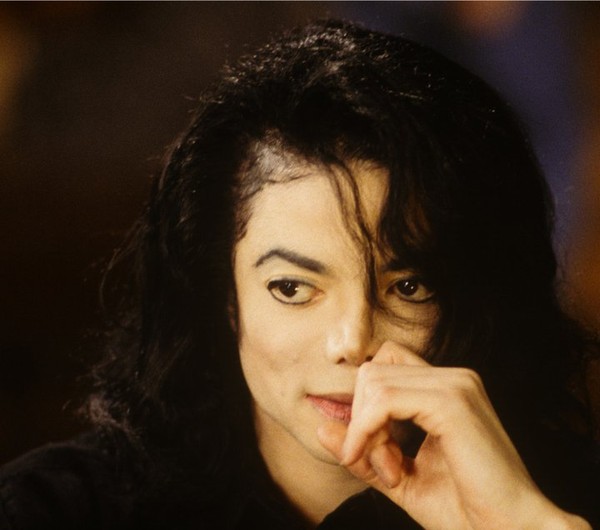
Nu är det så här va, att jag har lyssnat på "Morphine" om och om igen ikväll. Denna låt får mitt hjärta att likt en dränkt trasa att kramas i diskhon men istället för vatten så är det en uttömning av allt jag anser är rätt och gott, och vad som återstår är medkänsla och en massa frustration. Denna låt är ren guld.
Instrumenten är genialiska; finns det någonting liknande i andra låtar? Texten är genialisk; den behandlar alla perspektiv i en drogsituation av användning som läkemedel – den innehåller personifieringar av användaren, drogen, utomstående och läkaren. Denna låt är en svåröverkomlig strid i sinnet, med innehav av plåga, ilska, press, förvirring och ett skrik efter hjälp.
I första delen talar drogen där den säger saker som I need your body och Trust in me, samtidigt som den säger att den är A swine och So unreliable. I en lugnande, melodisk röst sjungs Relax, this won't hurt you. Before I put it in, close your eyes and count to ten. Don't cry, I won't convert you. There's no need to dismay, close your eyes and drift away, vilket är något en läkare skulle säga innan injektionen. Även de utomstående, eller övriga personer i användarens omgivning, är inkluderade, där de i sin förskräckelse och alienation av ämnet kommenterar och kritiserar Oh God, he's taking Demerol!
Sedan berättas historien om striden i sinnet (där "she" är drogen och "he" användaren): He's tried hard to convince her, to be over what he had – today he wants it twice as bad. Don't cry, I won't resent you. Yesterday you had his trust, today he's taking twice as much. Den första meningen refererar till att användaren har försökt att överkomma drogbehovet, men misslyckas. I andra meningen lovar drogen att inte skada sin partner, och i tredje meningen skrattar drogen bakom dens rygg för att ha lyckats bli ett behov.
Nu far låten tillbaka till hardcore och aggression, men ännu mera så.
En tankeställare; inte en låt som man förstår dess betydelse rakt av. Balansen mellan det snabba, hårda och mittdelarna älskar jag.
Men vad annat kan man förvänta sig när den är skriven av Michael Jackson ensam? Min beundran för honom kommer aldrig att svalna. För hans intention var att förmedla sanning i allt han skapade.
(Detta är min tolkning av låten, det finns naturligtvis andra tolkningar)
MINA TANKAR KRING XSCAPE

För varje album "skrev" (snarare beatboxade och sjöng hela arrangemanget i en liten bandspelare, såsom det geniet han var), Michael 60-70 låtar (!!) och L.A. Reid har fått tillträde till valtet där han förvarade ALLT. Valt 8 låtar, som Michael inte har släppt. Jag har hört att "Blue Gangsta" blev bortvald eftersom Michael gillade "Smooth Criminal" mer, och "Loving You" passade inte riktigt på Bad-albumets stuk.
Mina känslor är blandade för Xscape.
Även om jag gillar låtarna, betyder det inte att jag uppskattar att de har totalt ändrat stilen och soundet på flera av dem. Jag menar, var det inte meningen att de endast skulle modernisera låtarna, inte ändra dem? Exempelvis "Chicago" och "A Place With No Name" är helt olika från originalet.
Har ni sett dokumentären, som följde med Deluxe Edition? De (inte Stargate) beter sig som om deras remixer gör dem till musikgudar. Timbaland säger till och med under lyssnandet av originalet av "Blue Gangsta" att "This one don't sound as bad as the rest of them". Wtf?
Det faktum att Michael har sagt "I don't like remixes; I don't like it that they come in and change my songs", får mig att tveka om albumet. Som jag sa tidigare, så gillar jag låtarna – jag tycker exempelvis att instrumenten i "A Place With No Name" är hur häftiga som helst och Michaels röst i "Chicago" är så kraftfull att jag ryser, men de är ju inte alls såsom Michael hade tänkt att dem skulle vara.
Jag vet inte...!
Men samtidigt vet jag ju att detta är en hyllning, ett försök att "färdigställa" låtarna i Michaels anda. De må ha ändrat soundet på flera av dem, men hans röst. HANSS RÖSSSTTT. De har i alla fall inte kunnat ändra hans röst. Hans ENERGI.
Ni som tycker att det är respektlöst att dessa tidigare outgivna låtar har släppts har rätt. Men samtidigt tror jag inte att Michaels Estate skulle göra detta utan tillåtelse av Michaels familj. Och ni ska veta att Michael gillade dessa låtar. Bara det faktum att han spelade in mer än en vers av en låt betyder att han gillade låten, för det var så han arbetade: om han gillade känslan när han sjöng versen fortsatte han arbeta med låten.
Jag önskar att Michaels barn (eller Michaels mamma) kunde kommentera albumet. Vad de tycker, tycker jag.
WHAT HAPPENED TO THE TRUTH?
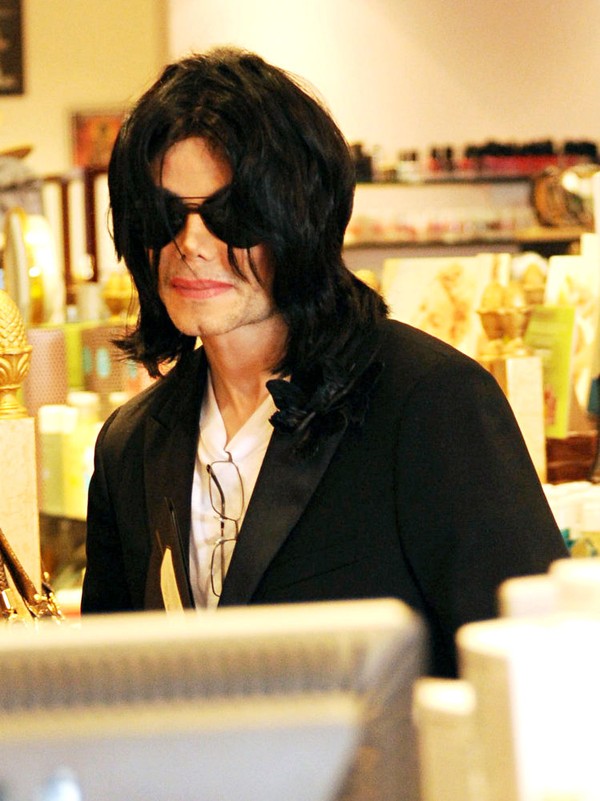
I engelskan skriver jag en uppsats om anledningarna till varför hela världen har accepterat att Michael Jackson är kungen av pop. Jag beskriver hur han revolutionerade musikvideoindustrin, alla hundratals priser han har vunnit och hur han krossade barriärerna mellan svarta och vita genom framgångarna av Thriller (då efterfrågan på hans musik var så stor att MTV tvingades visa videon till "Billie Jean", som var den första videon gjord av en svart artist som visades regelbundet på kanalen), och alla andra stora framgångar – så mycket större framgångar än någon annan musikartist.
Jag hade en fråga i frågeställningen: "Why is Michael Jackson called "The King of Pop?", men min lärare ville att jag gärna skulle ha ännu en fråga, och vet ni vad hans första förslag var? Att jag kunde skriva om pedofilanklagelserna. Det var det första han tänkte på när han tänkte på Michael Jacksons liv. Efter allt denna människa har gett världen. Det gör ont i hjärtat. Jag svarade snabbt att jag vill fokusera på hans yrke, och inte på sådant som är rena och skära lögner. Han frågade mig varför jag trodde det var lögner, och jag svarade att jag vet allt om det. Han sa i princip att han inte vet om det är sant eller inte.
Nu funderar jag starkt på att ta hans förslag som den andra frågan, för tydligen betyder det faktum att han oskyldighetsförklarades i rätten inte nog mycket.
Jag hatar att de gav honom denna svarta fläck. Snälla, kan de inte komma ut och berätta sanningen? Snälla, snälla.
YOU ARE ALWAYS IN MY HEART
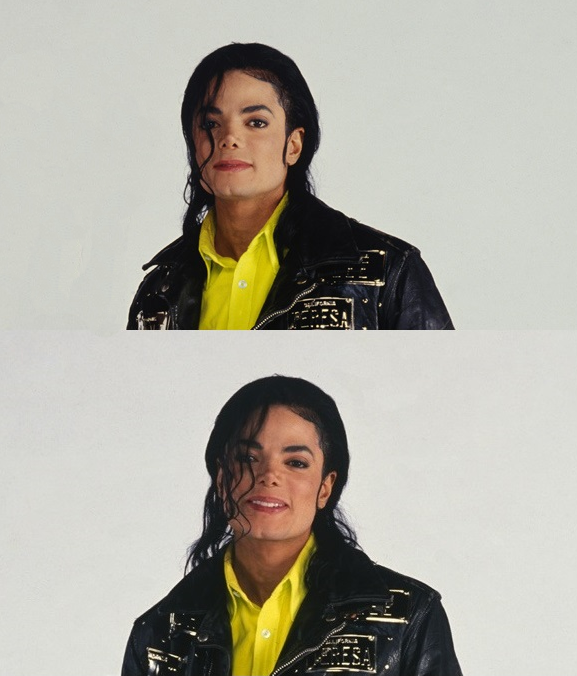
"DRUG ADDICT" IS NOT HIS LABEL
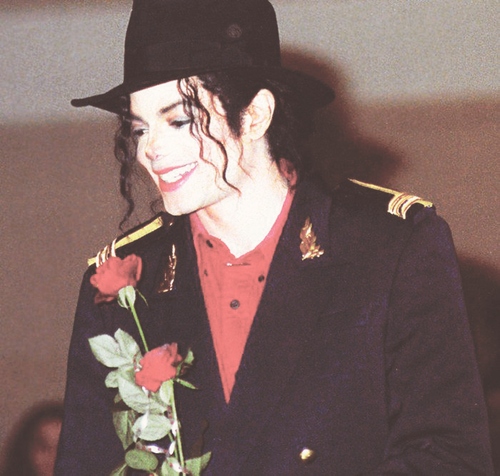
Inte för ett ögonblick ska du komma i närheten av tankar och känslor att han var drogberoende, inte för ett ögonblick ska du ens våga titta snett eller ned på honom på grund av vad som hände honom. Inte för ett enda ögonblick ska du tro att hans bortgång var hans fel.
OM "XSCAPE"
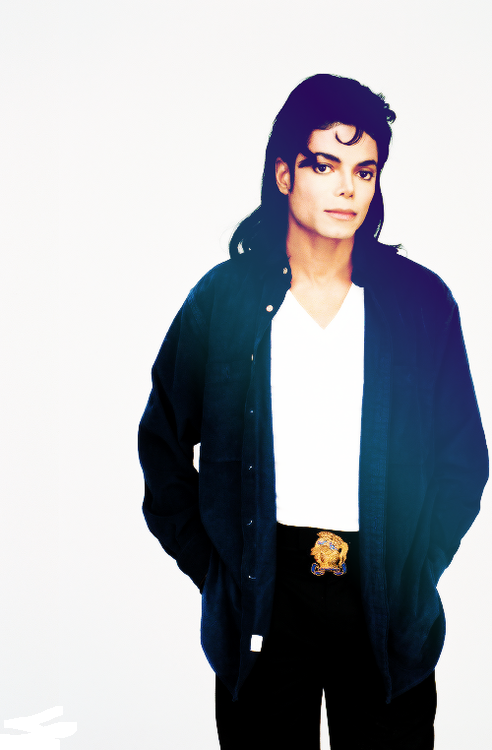
Jag har inte velat uttrycka vad jag tycker om det nya albumet Xscape, på grund av att jag vet att det finns så varierande åsikter om det, och denna blogg ska ju vara neutral åtminstone i nyhetsinläggen.
Men på begäran av Sandra att skriva vad jag tycker gör jag det.
Ena halvan av mig tänker "Han valde att inte släppa dessa låtar, och det beslutet borde respekteras" och andra halvan "Varför ska hans fantastiska musik ligga orört i ett valt, istället för att älskas av hans fans och bringa glädje?"
Jag kan inte riktigt bli euforisk, även om jag reagerade starkt när jag hörde nyheten (jag sprang efter mamma och ropade det till henne, haha). Men andra halvan av mig, vilken jag beskrev ovan, är ändå starkare än första halvan. Så jag kommer lyssna på albumet. Det är verkligen spännande!!
Och Sandra, jag gillar inte riktigt heller omslagsbilden, då det är så annorlunda från Michael, men jag gillar själva "rymd-feelingen". :)
MOTOWN OCH HOYT-SCHERMERHORN ST

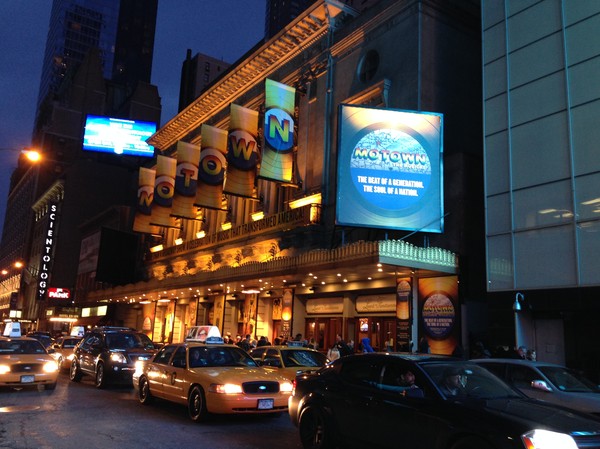


Igår kom jag hem från New York, och jag vill visa och berätta allt Michael Jackson-relaterat jag har fått uppleva där! Jag var på Motown-musikalen, som både Berry Gordy och Diana Ross tidigare har sett, och den var fantastisk. Lillkillen som spelade Michael i Jackson 5 var så duktig. Skådisen som spelade Diana Ross bad oss i salongen att fatta varandras händer även om vi var blyga, rädda eller hade svettiga händer, vilket fick mig direkt att tänka på Michaels tal där han uppmanade till samma sak. Det var fint.
I fredags for vi till Brooklyn och stannade på tunnelbanestationen Hoyt-Schermerhorn Streets, för där skapades magi! Där spelade Michael in kortfilmen till "Bad" och det var underbart. Direkt jag fattade att jag skulle på den här resan ville jag besöka den platsen. Tyvärr var sektionen (på bild ovan) avstängd – jag vet inte varför, men man fick då inte gå uppför den trappan där Michael egentligen höll till och spelade in videon, vilket var ledsamt. Jag frågade till och med polisen (det fanns en polisstation där i tunnelbanan) om de inte kunde öppna, men det kunde de inte då de inte hade tillgång till det. Men det faktum att Michaels röst har ljudats där samt att han har sprungit uppför trappan på bilden (vilket han gör i musikvideon) var så häftigt. Jag gick runt där med ett leende hela tiden, det var det bästa på hela resan, haha. <3
WE SHOULD ALL BE ASHAMED

Något av det jag blir argast och mest ledsen av ur Michaels historia är hur så många personer lämnade honom i sticket när han behövde en vän, eftersom de var rädda om sina egna karriärer. Sedan efter hans bortgång träder de fram och predikar om deras kärlek och respekt för honom. Det är suveränt att de visar sin kärlek för honom nu, men Michael är inte här och han hade verkligen behövt höra alla lovord när han fortfarande var i livet. Det var för tyst de sista åren innan 25 juni 2009.
Jag håller med det Danyel Smith säger i dokumentären BAD 25 om Michaels bortgång. Mitt hjärta sjönk när hon sa det, eftersom det är så brutalt sant. "We should all be ashamed. Each of us to a one."
Citatet av Frank Dileo, Michaels manager, om Michaels anklagelser 2005 är så hjärtskärande: "I wanted to let him know that I know he didn’t do it. In fact, when I went there, he didn’t know I was coming. It was very emotional. He went, ‘Frank, I can’t believe you’re here.’ And he started to cry. And I went over and I hugged him and we got on the elevator and he told [defense attorney] Tom Mesereau, ‘This is Frank Dileo. He used to manage me. I’ve had nine managers since then. He’s the only guy that showed up, or even called to see how I’m doing.’ That was a very rough thing on him, a very emotional thing.”
Detta är varför jag verkligen uppskattar Madonnas tal på VMA om Michael. Jag tackar henne eftersom hon tog upp detta och sa sanningen, att Michael hade blivit övergiven när han behövde alla mest. "When I first heard that Michael had died, all I could think about in that moment was, I had abandoned him, that we had abandoned him. That we had allowed this magnificent creature that once set the world on fire, to somehow slip through the cracks. While he was trying to build a family and rebuild his career, we were all busy passing judgement. Most of us had turned our backs on him."
Detta får mig att gråta.
MICHAEL JACKSON VIDEO VANGUARD AWARD
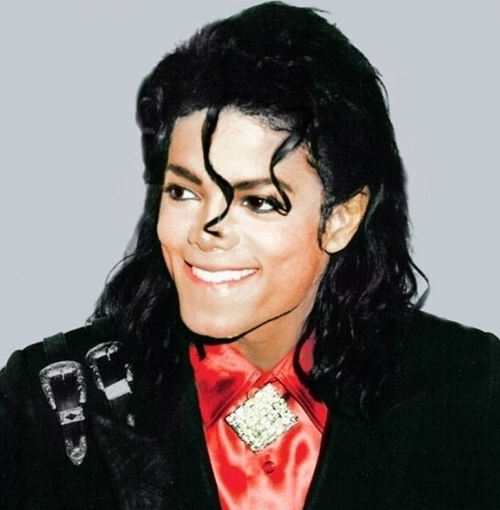
Vad jag är efter! Ni har säkert hört talas om priset "Michael Jackson Video Vanguard Award" som delas ut på Video Music Awards? Inatt delades Justin Timberlake priset. Det är ett pris som delas ut till de artister som har haft inverkan på MTV-kulturen och har varit i branschen en lång tid. Priset är också känt som "Lifetime Achievement Award" och det vet jag ju Michael har vunnit. Kul att de har namngett ett pris efter Michael!!!
SLAVE TO THE RHYTHM

"Slave to the rhythm" är en osläppt låt av Michael Jackson, som spelades in 1998 och som läckte 2010 till allmänheten. Nu har Justin Bieber gjort en duett av låten med sig själv och Michael. Jag läste kommentarerna på YouTube och det var många bråk mellan MJ-fansen och Bieber-fansen. Bieber-fansen säger att Michaels familj gav honom rättigheterna till låten, vilket inte är bekräftat. Andra Bieber-fans säger att Justin Bieber köpte låten av Michaels egendom, vilket inte heller är bekräftat.
Michaels estate har dock skrivit följande: "Hello there, for those who have been asking about the recently posted recording of "Slave 2 the rhythm" by Michael and Justin Bieber, this recording was not authorized and has been taken down. Best, The MJ Online Team."
Detta säger inte mycket. Vi vet inte om Justin Bieber kommer släppa låten officiellt i framtiden, eller om låten bara var en kul grej från Biebers sida att göra en duett med MJ vilken sedan råkades läcka ut(?).
Jag vet inte vad ni tycker, men jag tycker inte detta känns rätt. Jag hoppas att låten bara är en kul grej från Justins sida och att den aldrig kommer släppas officiellt. Det känns bara väldigt fel att göra en duett med en annan artist som har gått bort och vars låt som var hans egen. Nu låter jag väldigt sansad, men jag är väldigt känslosam om detta... Jag vill bara få veta mer information, om vad som kommer att hända. Den här låten känns inte äkta. Men om det verkligen är Michaels familj som gav bort den (vilket jag tvivlar starkt på eftersom de har egentligen ingen tillgång till Michaels låtar förutom Michaels estate) så tycker jag det är okej, eftersom Michaels familj är Michaels familj och de känner MJ mest.

